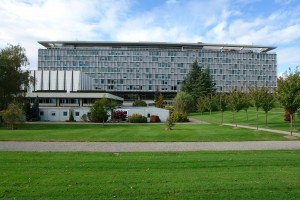This post continues the discussion from my last post, which raised the question: why has the Ebola crisis become so severe? Another contributing factor: the “dismal” response of the World Health Organization (WHO), a United Nations auxiliary organization.
“And we are not the first responder. You know, the government has first priority to take care of their people and provide health care. W.H.O. is a technical agency.”
And, of course, in addition to affected states, charitable NGOs like Doctors without Borders have an essential role to play as well. However, the WHO’s responsibility for coordination of the the international response the disease and ability to provide technical assistance to stricken region are also important. But, quoting Foreign Policy’s Laurie Garret the WHO has been “AWOL.”
Why has the WHO been behind the ball in this crisis? Besides any leadership failures or institutional inertia, it’s just not adequately resourced to address the crisis. The financial crisis of 2008 is a key piece of that puzzle. Not surprisingly, as government budgets tanked, WHO revenues—which is based primarily philanthropy of the international community—dried up. A knock-on effect in the currency markets worsened the blow to WHO. Traders ditching their Euros drove up the price of Swiss Francs 32% compared to the US dollar. Because WHO is headquartered in Geneva, Switzerland, its income—received primarily in US dollars—shrank dramatically in relation to its expenses in Francs. Shifting public health priorities, namely the growing impact of noncommunicable conditions such as cancer and heart disease in industrialized society, and intense financial pressures led to a fateful budgeting decision. In 2012, WHO’s crisis and epidemic funding was cut in half. Tumult at WHO—a factor completely independent of Ebola’s properties as a disease—helps to explain this outbreak’s severity. Next week, we’ll investigate further abiotic factors fueling the eruption of Ebola in West Africa, so check back then.

